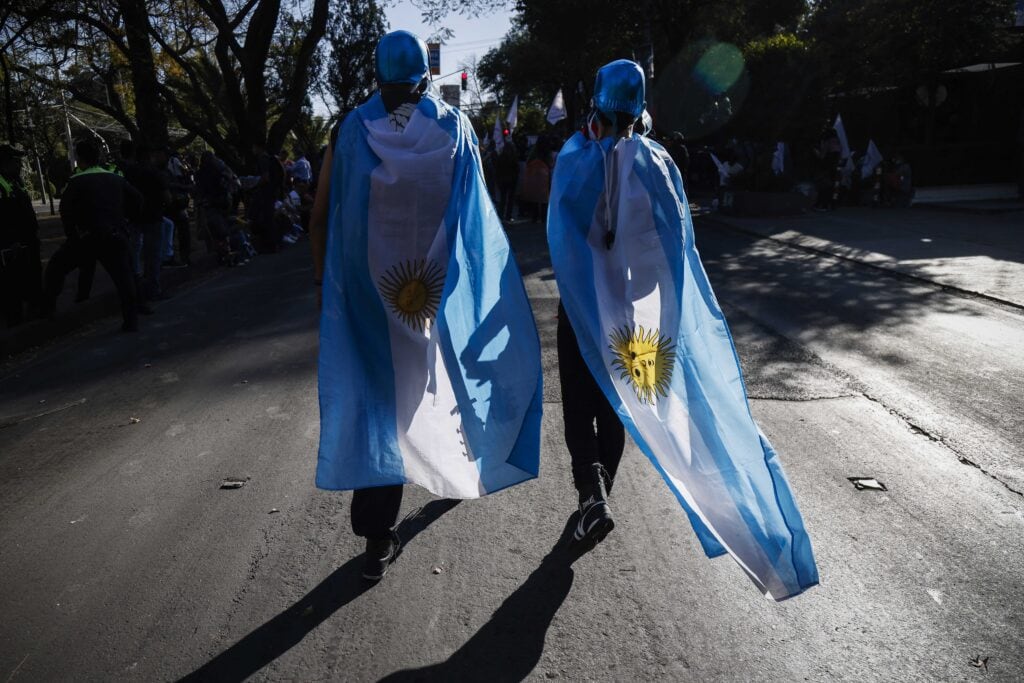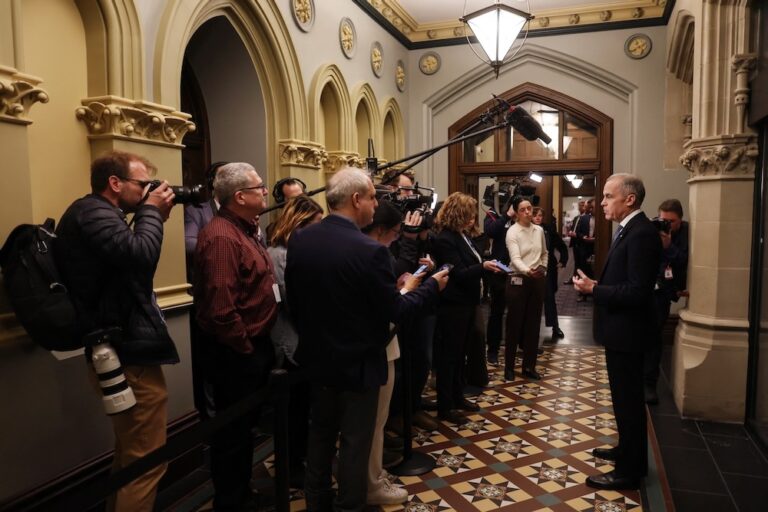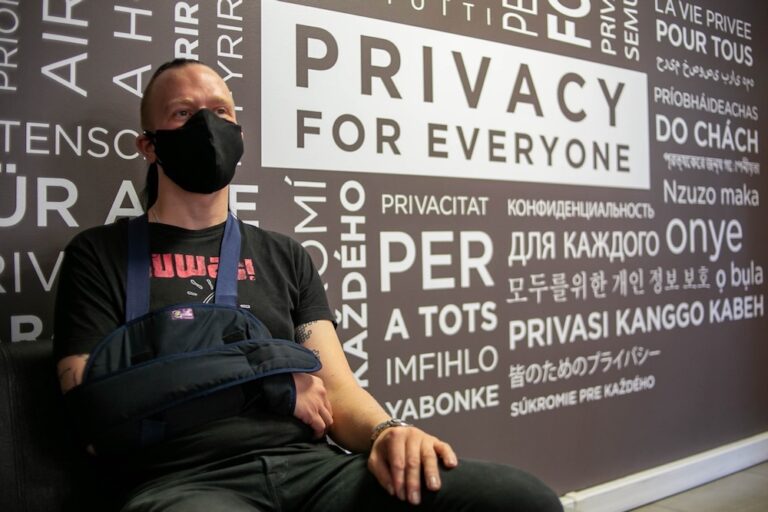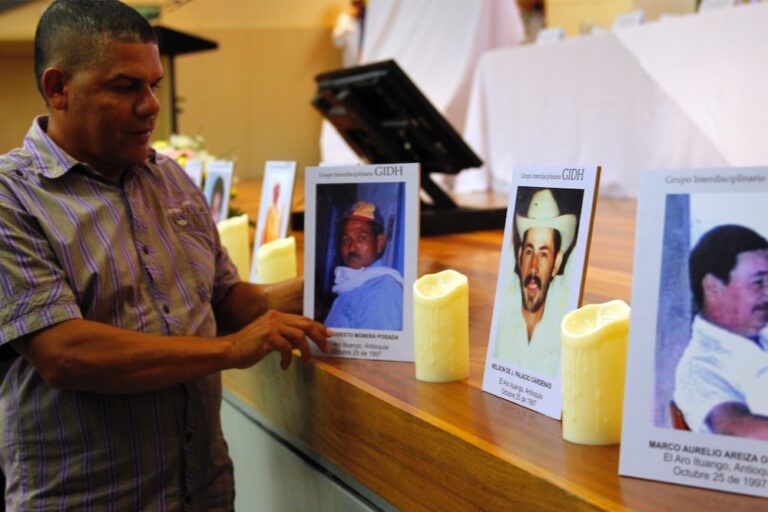IFEX-ALC, Alianza Regional por la Libre Expresión e Información [the Regional Alliance for Free Expression and Information], and Red Voces del Sur [the Voices of the South network]- three regional networks defending freedom of expression and press freedom– express our concern over the closure of civic space in Argentina as a consequence of the subjugation of freedom of information, expression, press, demonstration and peaceful assembly promoted by the current administration.
We demand that the government of Argentina release all individuals arbitrarily detained while exercising their right to demonstrate; repeal the protocol approved through Resolution 943/2023; and eliminate all mechanisms and instruments that impede the work of journalists. We demand that the functioning of civic space in Argentina be guaranteed and protected.
The right to protest is threatened
After assuming power in December 2023, President Javier Milei and Minister of Security Patricia Bullrich issued Resolution 943/2023: “Protocol for the maintenance of public order in the face of roadway blockages.” The protocol establishes that demonstrations that block streets or routes are considered in flagrante delicto crimes, and authorizes the police and security forces to evict or disperse protestors without court order.
Since its implementation, the law has enabled the criminalization, persecution, and stigmatization of an array of civic actors, including demonstrators; activists; political leaders; and political, social and trade union organizations. It has also legalized excessive use of force by the police and resulted in dozens of arbitrary arrests in anti-government social mobilizations.
In the absence of official data, civil society organizations have monitored police repression during protests between January and June and identified:
- 80 individuals arbitrarily detained in Buenos Aires City, Córdoba and Rosario
- 665 individuals with injuries of varying severity; two of them lost their sight due to the impact of rubber bullets
- 47 injured press workers
On Wednesday, June 12, an illustrative case of the negative effects of the protocol took place while the Senate was discussing a key bill (Ley de Bases) proposed by the Milei government. Opponents of the law who were demonstrating outside Congress while the Senate debated the bill were repressed by police and security forces with tear gas and rubber bullets. While there were isolated violent episodes during the demonstration, the overall use of force by the police was disproportionate.
During the demonstration, 33 people were arbitrarily detained, accused of attempted coup d’état and terrorism, and taken to jail. Judge María Servini, who oversaw the case, criticized the police actions and accused the security forces of having given her incomplete information on the detentions. As a result, Servini ruled that 28 of the arrests lacked merit and must be released, while the remaining five were charged and remanded to custody in federal prisons.
Almost a month later, four protestors remain in jail even though there is no clear evidence linking them to the violent and isolated acts that occurred that day. The Inter-American Commission on Human Rights (IACHR) and its Special Rapporteurship for Freedom of Expression warned the government to refrain from criminalizing protest and to guarantee the right to free expression. However, representatives of the Argentine government insisted that the arrests had not been arbitrary, citing the framework of the Human Rights Council of the United Nations (UN).
Repression of dissident voices and journalists
In addition to the cases of intimidation and physical repression against protestors, the Milei administration has sought to criminalize and delegitimize organized, anti-government social mobilizations carried out by community leaders, civil society organizations, communicators, activists, and journalists. While local and international organizations have denounced these acts on social media, the President and senior officials have continued attempts to discredit anyone who objects to government policies, aiming to discredit their critical role in society. This has led to a situation in which those speaking out publicly have faced high costs in terms of exposure, finger-pointing, and reputational damage.
We are equally concerned about recent attempts to repress the practice of journalism. Since Milei stepped into power, he has closed the public news agency, Télam, which was the only federal news agency in the country. This dramatically reduced the plurality of journalism and limited citizens’ access to information. We are also alarmed by the Ministry of Human Capital’s attempt at reintroducing the compulsory registration of journalists. This is an obsolete measure, which has been considered an illegitimate restriction on the right to freedom of expression by the IACHR since 1985.
All of these practices weaken and limit civic space and degrade the quality of democracy, as observed in other countries across the region. The free expression of dissenting opinions and the right to peaceful protests against state policies are legitimate and fundamental human rights. An independent and critical press is essential for the protection of other freedoms in any lawful society. Unwarranted accusations by authorities– especially given the imbalance of power– have silencing effects that undermine the quality of public discourse. It is imperative that freedom of the press remains absolute in contexts of social upheaval. The exercise of journalism and the physical and mental well-being of media workers must be respected by the government at all times.



